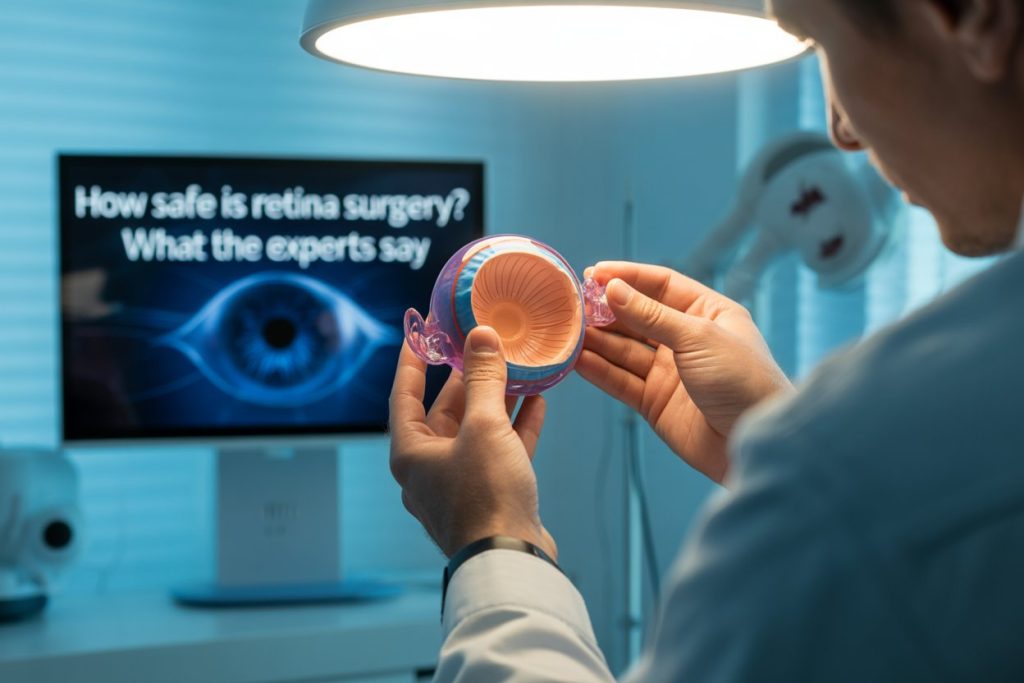How Safe Is Retina Surgery? What the Experts Say

Is Retina Surgery Safe?
Retina surgery—once considered complex and risky—is now one of the most advanced and successful procedures in modern ophthalmology. With innovations like Microincision Vitrectomy Surgery (MIVS) and Anti-VEGF treatments, patients today can expect high success rates and minimal complications. But how safe is retina surgery, really? Let’s break down what the experts say, the potential risks, and what you need to know to make an informed decision.
Understanding Retina Surgery: Types & Purpose
Retina surgery refers to a range of procedures that treat diseases affecting the retina, including:
- Vitrectomy – for retinal detachment, diabetic retinopathy, or macular hole
- Scleral Buckle – to close retinal breaks
- Pneumatic Retinopexy – minimally invasive for smaller detachments
- Laser Retinopexy – seals retinal tears
- Macular Surgery – treats macular holes or epiretinal membranes
These surgeries aim to restore vision, prevent permanent blindness, and repair retinal damage due to trauma or disease.
How Safe Is Retina Surgery? What the Experts Say
According to global data and leading retina specialists:
- Success Rate: Most retina surgeries report an 85–95% primary success rate, especially for procedures like retinal detachment and macular hole repair.
- Expert Opinions: Dr. Madhava Rao, a leading vitreoretinal surgeon, notes that “advances in surgical technique, instrumentation, and postoperative care have significantly reduced complication rates.”
- Safety Protocols: Pre-surgical screenings, sterile operation environments, and real-time imaging reduce intraoperative risks.
- Recovery Outcomes: The majority of patients experience improved or stabilized vision post-surgery.
Potential Risks & Complications (Though Rare)
Like any surgical procedure, retina surgery does involve certain risks:
- Infection (endophthalmitis) – <1% when safety protocols are followed
- Bleeding inside the eye
- Retinal re-detachment
- Elevated intraocular pressure
- Cataract progression (common in vitrectomy)
- Visual distortions or blurring in early recovery
- However, these risks are well-managed by experienced retina surgeons and rarely affect long-term outcomes.
Retina Surgery Safety for Elderly & Diabetic Patients
Many elderly patients or those with diabetes wonder if retina surgery is safe for them.
- Elderly patients tolerate retina surgery well with proper anesthesia and care.
- Diabetic retinopathy surgeries, like vitrectomy with anti-VEGF injections, are now safer and highly effective due to technological improvements.
Early diagnosis and treatment play a major role in improving success rates in both groups.
Retina Surgery Safety Tips for Patients
Here are expert-recommended tips to ensure maximum safety before and after retina surgery:
Pre-Surgery
- Disclose all medications and health conditions
- Follow fasting guidelines
- Arrange for a caregiver post-surgery
Post-Surgery
- Avoid rubbing the eye
- Follow eye drop schedule
- Sleep in prescribed positions (especially for macular surgeries)
- Attend all follow-up appointments
Retina Surgery Outcomes: What to Expect
- Visual improvement usually begins within 2–4 weeks
- Full recovery may take 2–3 months depending on the procedure
- In successful cases, patients regain functional vision or halt vision loss progression
- Repeat surgeries are rare when early intervention is done
Advancements That Enhance Retina Surgery Safety
- Microincision tools (23/25/27-gauge vitrectomy)
- Intraoperative OCT and 3D visualization
- Sutureless techniques reducing infection risk
- Preloaded anti-VEGF injectables for diabetic eye disease
These technologies make retinal procedures faster, safer, and more accurate.
FAQs:
Q1: Is retina surgery safe for elderly patients?
Yes, with proper pre-op evaluation and care, retina surgery is safe and effective even in older adults.
Q2: What is the success rate of retina surgery?
Most procedures have an 85–95% success rate depending on the condition being treated.
Q3: What are the side effects of retina surgery?
Mild discomfort, blurred vision, or floaters may occur temporarily. Serious complications are rare.
Q4: How long is recovery after retina surgery?
Recovery varies by procedure, but most patients improve within weeks and stabilize by 2–3 months.
Q5: Can retina surgery restore lost vision?
Yes, especially when performed early. While it may not fully restore vision, it often significantly improves or stabilizes it.
Q6:What do retina specialists say about surgery safety?
Experts agree that modern retina surgeries are safe, highly effective, and essential for preventing vision loss.
Q7: Is vitrectomy a painful surgery?
No, it’s typically done under local or general anesthesia, and post-op pain is minimal and manageable.
Protect Your Vision Starting Today
If you’re facing retinal issues like floaters, flashes, or blurred central vision, don’t wait. At RetinaCare Abu Dhabi, our expert team—led by world-renowned retina specialists—offers advanced diagnostic and surgical care tailored to your eye health.
📞 Book your retina consultation today and take the first step toward clearer, safer vision.
👉 Visit Dr. Madhava Rao
to schedule your appointment.



